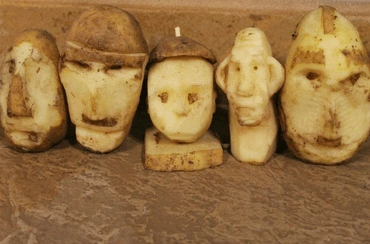1
וילך שמשון עזתה וירא־שם אשה זונה ויבא אליה׃
2
לעזתים לאמר בא שמשון הנה ויסבו ויארבו־לו כל־הלילה בשער העיר ויתחרשו כל־הלילה לאמר עד־אור הבקר והרגנהו׃
3
וישכב שמשון עד־חצי הלילה ויקם בחצי הלילה ויאחז בדלתות שער־העיר ובשתי המזוזות ויסעם עם־הבריח וישם על־כתפיו ויעלם אל־ראש ההר אשר על־פני חברון׃ ף
4
ויהי אחרי־כן ויאהב אשה בנחל שרק ושמה דלילה׃
5
ויעלו אליה סרני פלשתים ויאמרו לה פתי אותו וראי במה כחו גדול ובמה נוכל לו ואסרנהו לענתו ואנחנו נתן־לך איש אלף ומאה כסף׃
6
ותאמר דלילה אל־שמשון הגידה־נא לי במה כחך גדול ובמה תאסר לענותך׃
7
ויאמר אליה שמשון אם־יאסרני בשבעה יתרים לחים אשר לא־חרבו וחליתי והייתי כאחד האדם׃
8
ויעלו־לה סרני פלשתים שבעה יתרים לחים אשר לא־חרבו ותאסרהו בהם׃
9
והארב ישב לה בחדר ותאמר אליו פלשתים עליך שמשון וינתק את־היתרים כאשר ינתק פתיל־הנערת בהריחו אש ולא נודע כחו׃
10
ותאמר דלילה אל־שמשון הנה התלת בי ותדבר אלי כזבים עתה הגידה־נא לי במה תאסר׃
11
ויאמר אליה אם־אסור יאסרוני בעבתים חדשים אשר לא־נעשה בהם מלאכה וחליתי והייתי כאחד האדם׃
12
ותקח דלילה עבתים חדשים ותאסרהו בהם ותאמר אליו פלשתים עליך שמשון והארב ישב בחדר וינתקם מעל זרעתיו כחוט׃
13
ותאמר דלילה אל־שמשון עד־הנה התלת בי ותדבר אלי כזבים הגידה לי במה תאסר ויאמר אליה אם־תארגי את־שבע מחלפות ראשי עם־המסכת׃
14
ותתקע ביתד ותאמר אליו פלשתים עליך שמשון וייקץ משנתו ויסע את־היתד הארג ואת־המסכת׃
15
ותאמר אליו איך תאמר אהבתיך ולבך אין אתי זה שלש פעמים התלת בי ולא־הגדת לי במה כחך גדול׃
16
ויהי כי־הציקה לו בדבריה כל־הימים ותאלצהו ותקצר נפשו למות׃
17
ויגד־לה את־כל־לבו ויאמר לה מורה לא־עלה על־ראשי כי־נזיר אלהים אני מבטן אמי אם־גלחתי וסר ממני כחי וחליתי והייתי ככל־האדם׃
18
ותרא דלילה כי־הגיד לה את־כל־לבו ותשלח ותקרא לסרני פלשתים לאמר עלו הפעם כי־הגיד [כ= לה] [ק= לי] את־כל־לבו ועלו אליה סרני פלשתים ויעלו הכסף בידם׃
19
ותישנהו על־ברכיה ותקרא לאיש ותגלח את־שבע מחלפות ראשו ותחל לענותו ויסר כחו מעליו׃
20
ותאמר פלשתים עליך שמשון ויקץ משנתו ויאמר אצא כפעם בפעם ואנער והוא לא ידע כי יהוה סר מעליו׃
21
ויאחזוהו פלשתים וינקרו את־עיניו ויורידו אותו עזתה ויאסרוהו בנחשתים ויהי טוחן בבית [כ= האסירים] [ק= האסורים]׃
22
ויחל שער־ראשו לצמח כאשר גלח׃ ף
23
וסרני פלשתים נאספו לזבח זבח־גדול לדגון אלהיהם ולשמחה ויאמרו נתן אלהינו בידנו את שמשון אויבינו׃
24
ויראו אתו העם ויהללו את־אלהיהם כי אמרו נתן אלהינו בידנו את־אויבנו ואת מחריב ארצנו ואשר הרבה את־חללינו׃
25
ויהי [כ= כי] [כ= טוב] [ק= כטוב] לבם ויאמרו קראו לשמשון וישחק־לנו ויקראו לשמשון מבית [כ= האסירים] [ק= האסורים] ויצחק לפניהם ויעמידו אותו בין העמודים׃
26
ויאמר שמשון אל־הנער המחזיק בידו הניחה אותי [כ= והימשני] [ק= והמשני] את־העמדים אשר הבית נכון עליהם ואשען עליהם׃
27
והבית מלא האנשים והנשים ושמה כל סרני פלשתים ועל־הגג כשלשת אלפים איש ואשה הראים בשחוק שמשון׃
28
ויקרא שמשון אל־יהוה ויאמר אדני יהוה זכרני נא וחזקני נא אך הפעם הזה האלהים ואנקמה נקם־אחת משתי עיני מפלשתים׃
29
וילפת שמשון את־שני עמודי התוך אשר הבית נכון עליהם ויסמך עליהם אחד בימינו ואחד בשמאלו׃
30
ויאמר שמשון תמות נפשי עם־פלשתים ויט בכח ויפל הבית על־הסרנים ועל־כל־העם אשר־בו ויהיו המתים אשר המית במותו רבים מאשר המית בחייו׃
31
וירדו אחיו וכל־בית אביהו וישאו אתו ויעלו ויקברו אותו בין צרעה ובין אשתאל בקבר מנוח אביו והוא שפט את־ישראל עשרים שנה׃ ף







